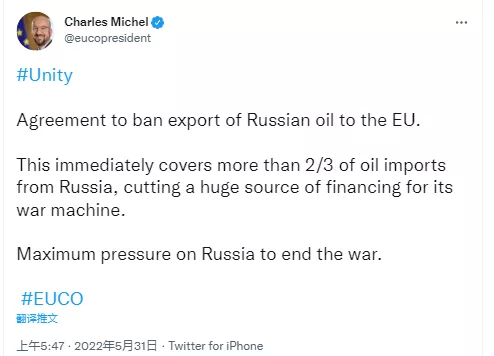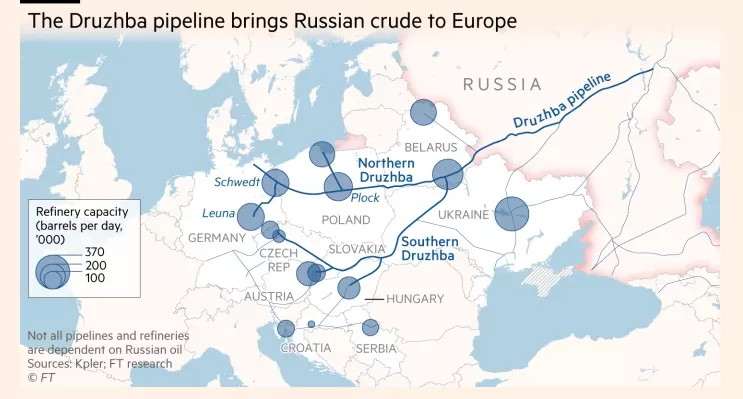At the late night of May 30 local time, EU leaders reached an agreement at the EU summit, agreeing to partially ban Russian oil imports and exempt a key land oil supply pipeline, so as to win the support of Hungary. This news pushed the international oil price higher in the short term. As of the press release, the main contract price of WTI crude oil futures was USD 117.67/barrel, a new high since mid March this year and close to the high since 2008.
EU announces ban on oil exports
The two-day EU special summit was held in Brussels on Monday. The most important task of this summit is to promote a breakthrough in the new round of sanctions against Russia, including the oil embargo against Russia, which has attracted much attention from the outside world.
As early as a month ago, EU Member States proposed a ban on Russian oil imports. However, EU member states still have differences on this issue. Hungary, which is highly dependent on Russian oil, is the main opponent of the ban.
The boycott from Hungary has hindered the latest round of EU sanctions, while Slovakia, the Czech Republic and other landlocked countries that are highly dependent on Russian oil have also requested to postpone the ban.
However, the negotiations at the EU summit on Monday evening were unexpectedly quick to achieve results.
Charles Michel, President of the European Council, announced that EU leaders had agreed to prohibit Russia from exporting oil to the EU group of 27. Michelle wrote on Twitter: "immediately covered more than two-thirds of the oil imported from Russia."

He added that the leaders also agreed to cut off the business of Russia's largest bank, Sberbank, in the swift system and ban the business of the other three Russian state-owned broadcasters.
EU diplomats said that the oil embargo would include oil and petroleum products, but would exempt crude oil transported through pipelines to Hungary, Slovakia and the Czech Republic.
German Chancellor Olaf Scholz said that the agreement proved that the EU was united. He added: "we have reached an agreement on more far-reaching sanctions against Russia. Most of Russia's oil imports will be embargoed."
By the end of the year, about 90% of oil imports were banned
The ban will cover maritime oil purchases, which cover about two-thirds of European imports from Russia. In addition, Germany and Poland promised to stop importing oil through the Druzhba pipeline in the short term. It is expected that the ban coverage will reach 90% by the end of this year.

Druzhba oil pipeline transporting oil from Russia to Europe
The exclusion of pipeline imports from any embargo has been a major requirement for Hungary. The country pointed out that the ban would put its economy at risk in view of its dependence on Russian crude oil. Hungarian prime Minister Viktor orb á n also asked the EU to ensure that it can still obtain Russian oil from other sources in the event of the "accident" of the Druzhba pipeline.
This ban may distort the competition in the EU oil market, and refineries connected to the Russian pipeline will enjoy a price advantage.
As European traders have been avoiding the country's marine crude oil since the war between Russia and Ukraine, Russian oil prices have fallen sharply. At present, the trading price of Russian ural crude oil is about US $93 per barrel, while the trading price of international oil benchmark Brent crude oil is US $120.
Although Rosneft delivered through the Druzhba pipeline may not have such a big discount - depending on the structure of the contract, Hungarian oil group said that since March, the profit margin of its refinery was "soaring" due to "the expansion of Brent ural price difference".
Argus, an energy price reporting agency, said that since the war between Russia and Ukraine, although the shipping volume from Russia to Europe has decreased by 500000 barrels / day, the oil shipment volume of the Druzhba pipeline in April increased by 100000 barrels / day compared with that in January, and it is expected to increase again in may.